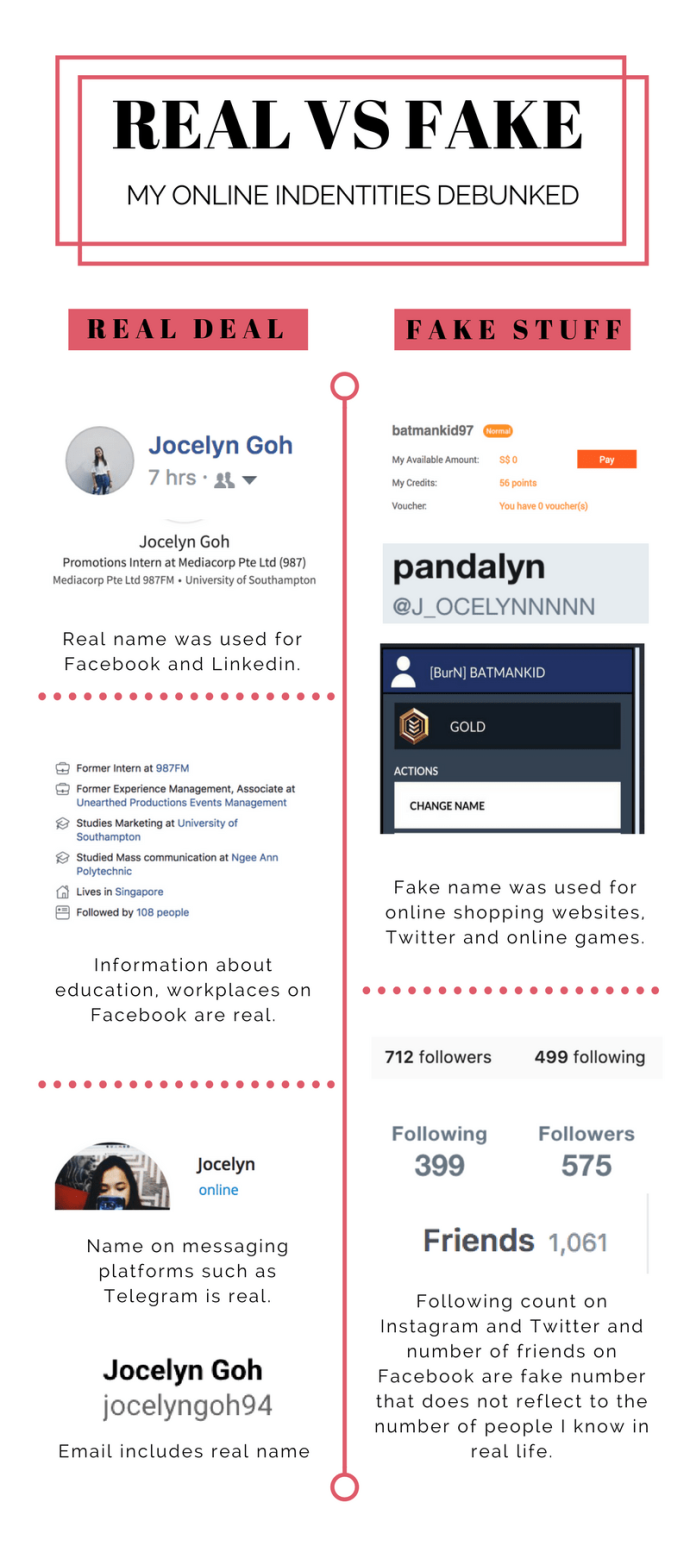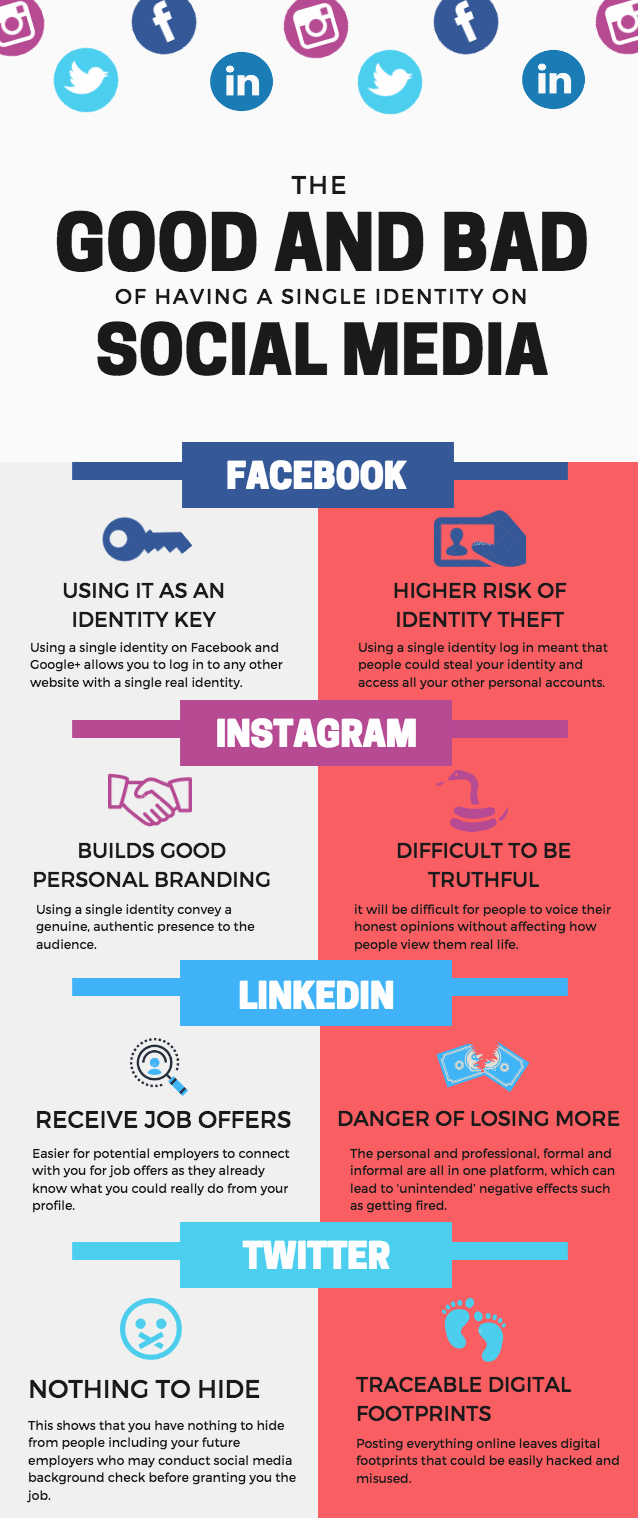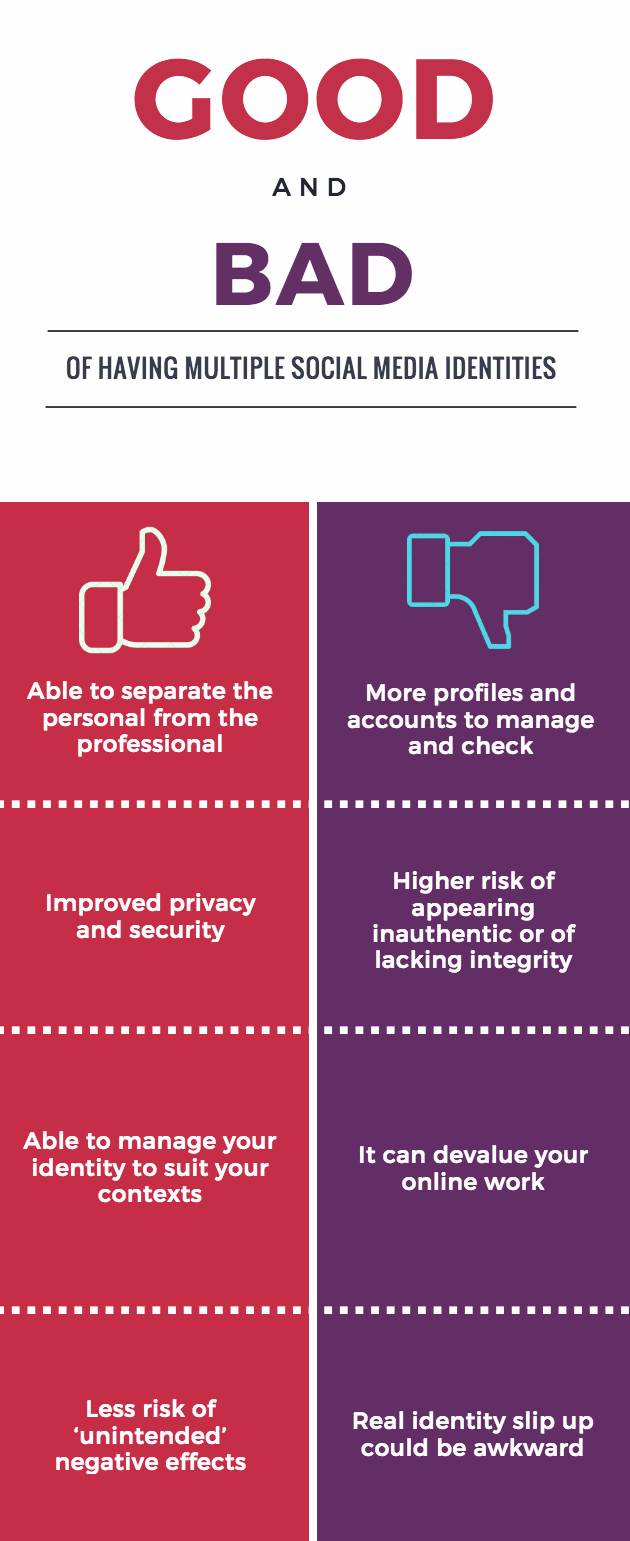We discussed ‘fake’ news last week but what about you being a snake (🐍) because you’re F-A-K-E?!
Creating an online identity usually involves a degree of pretence to hide certain information about yourself (Longair, 2006). It is commonly found on social media, online gamings, resale platforms etc.
There are two types of approaches to online identity – single or multiple. Single identity approach is where you put in your real identity and multiple approach is when you decide to mask your identity in any way (Futurelearn).
This was an iconic comic created 24 years ago that was used to describe how people’s online personas differ from real life.

Source: Know Your Meme
I am guilty of being a snake – being fake online. I have created a breakdown on how I have used single and multiple identities on various platforms. I currently have 1 Facebook and Twitter account, 3 Instagram accounts, 2 YouTube accounts and 2 websites.

Source: Screenshots by me
As I used both single and multiple identities for these online platforms, I do sometimes face the problem of posting on the wrong account, unable to create a separation between personal and work life.
Here’s a breakdown of the good and bad of using single identity online.

Infographics created by me. Source: FutureLearn, GigaOm
Different sites, different audiences, different purposes. – Nicole Lee
People create multiple identities to cater to different audience (Casserly, 2011). A study from Pennsylvania State University finds that many social media users tweak the way they come off on different platforms because they just want to fit in.
Here’s the breakdown of the good and bad for having multiple identities online:

Infographics created by me. Source: FutureLearn, Social Media Today
Here’s a Ted Talk by Ulrike Schultze on how social media shapes our identity:
Source: TedxTalk
Currently I have no major problem managing my multiple online identities and I feel more relieved knowing that my personal and work online platforms are separated.
“I don’t trust nobody, nobody trusts me.” – Taylor Swift
Do you also have multiple online personalities like me or will you still trust me now that I have told you about my other alter egos?
(313 words)
Sources:
Bonari, A. (2011). The Pros and Cons of Using an Alias for Your Online Persona. Social Media Today. Retrieved from https://www.socialmediatoday.com/content/pros-and-cons-using-alias-your-online-persona
Bowes, P (2013). Is your virtual self employable?. BBC News. Retrieved from http://www.bbc.com/news/av/business-25217962/job-hunting-how-to-promote-yourself-online
Casserly, M. (2011). Forbes.com. Retrieved from https://www.forbes.com/sites/meghancasserly/2011/01/26/multiple-personalities-and-social-media-the-many-faces-of-me/
FutureLearn. (2017). What is your network identity? – Learning in the Network Age – University of Southampton. (2017). Retrieved from https://www.futurelearn.com/courses/learning-network-age/3/steps/263025
Garden, H., Networking, S., & Networks, S. (2017). Our Online Personalities Change Across Different Social Media Platforms. HowStuffWorks. Retrieved from https://computer.howstuffworks.com/internet/social-networking/networks/online-personality-change-social-media.htm
Gonzalez, R. (2014). Who Are You? How to Develop a Brand Identity for Instagram. (2014). Likeable Media. Retrieved from https://www.likeable.com/blog/2014/08/who-are-you-how-to-develop-a-brand-identity-for-instagram
How Social Media Shapes Identity | Ulrike Schultze | TEDxSMU. (2015). YouTube. Retrieved from https://www.youtube.com/watch?v=CSpyZor-Byk&t=22s
Ingram, M. (2011). Why Twitter doesn’t care what your real name is. Gigaom. Retrieved from https://gigaom.com/2011/09/16/why-twitter-doesnt-care-what-your-real-name-is/
Krotoski, A. (2012). Online identity: is authenticity or anonymity more important?. the Guardian. Retrieved from https://www.theguardian.com/technology/2012/apr/19/online-identity-authenticity-anonymity
Lee, N. (2016) Having multiple online identities is more normal than you think. Engadget. Retrievedfrom https://www.engadget.com/2016/03/04/multiple-online-identities/
On the Internet, Nobody Knows You’re a Dog. (2012). Know Your Meme. Retrieved from http://knowyourmeme.com/memes/on-the-internet-nobody-knows-youre-a-dog
Pennsylvania State University (2017). Pike.psu.edu. Retrieved from http://pike.psu.edu/publications/icwsm17.pdf
Pilkington, E. (2013). Justine Sacco, PR executive fired over racist tweet, ‘ashamed’. the Guardian. Retrieved from https://www.theguardian.com/world/2013/dec/22/pr-exec-fired-racist-tweet-aids-africa-apology
Taylor Swift – Look What You Made Me Do (Lyric Video). (2017). YouTube. Retrieved from https://www.youtube.com/watch?v=3K0RzZGpyds
Taylor Swift Is a Snake. (2016). Know Your Meme. Retrieved from http://knowyourmeme.com/memes/taylor-swift-is-a-snake

Hi Jocelyn,
I love the infographics and the breakdown of your personal identity on the web. I concur with what you’ve mentioned about multiple identities being use to cater to different audiences. However, I’m not too convinced on your definition authenticity, or lack thereof. This might sound like an oxymoron but I’m increasingly convinced that being fake allows one to be truly authentic. In Goffman’s dramaturgical approach, he described social interactions as performances with actors and audiences. Performances take place on a ‘front stage’, where individuals present idealized versions of themselves to the audience. There is also the ‘back stage’, where actors or individuals can relieve themselves of the role or character they’ve played and revert to their true selves (Goffman,1959). In that sense, being ‘fake’ online can be an accurate representation of social interactions in reality.
Also, it appears that authenticity is merely a social construct (Peterson, 2005). It was suggest that “a person is authentic if she 1) is what we expect her to be; 2) meets the standards for the culture and circumstances from which she comes; and, 3) puts on a creative and sincere performance of identity (Peterson, 2005). Hence, a contrived identity that is convincing might end up being considered as authentic.
This leads me to ask, will an online ‘backstage’ actually be a more authentic representation of the individual or reality?
Hope to hear from you soon!
Kirby Koh Gengshan
References:
1. https://web.csulb.edu/~hmarlowe/SOC335/Goffman_Dramaturgical_Model.pdf
2. http://onlinelibrary.wiley.com/doi/10.1111/j.1467-6486.2005.00533.x/abstract;jsessionid=A5410AD13CE1192BA47BD21DB3EF7E70.f02t03
LikeLike
Hi Jocelyn, great work here.
I share the same sentiments with you – that you feel more relieved knowing that your personal and work online platforms are separated.
However quoting from Richard Allan (Facebook director of policy in Europe), “authentic identity outweighs the costs”. Do you feel that in this day and age with all the security features, it is possible to have a single identity because you can be in control of what you show the public and to your personal friends? Would this be a better choice compared to having multiple identities where your authenticity could be questioned?
A study reported by Business News Daily, found that 61 percent of employers conduct social screenings to look for information that supports a candidate’s qualifications for the job. Therefore it is saying that employers are not only there to find reasons not to hire someone. What is your take on this?
(150 words)
Reference:
BusinessNewsDaily. 2017. Keep It Clean: Social Media Screenings Gain in Popularity – Chad Brooks [ONLINE] Available at: https://www.businessnewsdaily.com/2377-social-media-hiring.html
LikeLike